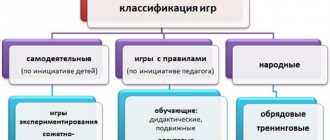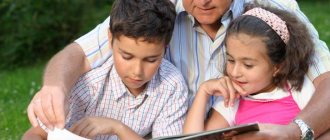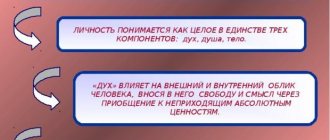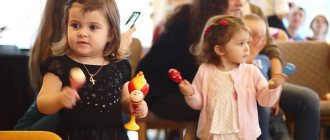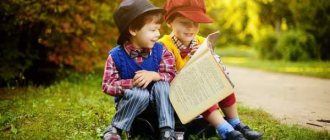The essence of training and education of preschool children
Definition 1
Preschool age is the age period from 3 years before entering school (up to 7 years), during which the comprehensive development and formation of the child’s personality occurs.
During the period of preschool childhood, children actively develop analyzers, imagination, memory, speech, thinking, sensory knowledge of the world occurs, the formation of a worldview and attitude to the surrounding reality.
The period of preschool childhood is a unique and important stage in the development of a child’s personality. What is laid down in preschool age determines what a person will grow up and become in the future.
That is why the processes of upbringing and teaching preschool children are given such great importance. Despite the fact that training and education are implemented by different types of pedagogical activities, they are closely interconnected, and the effectiveness of the formation and development of personality largely depends on their combined application. It is impossible to educate a worthy person without the process of education, just as it is impossible to obtain an educated person without the process of education. Only education and training implemented in totality and unity are capable of forming an educated and well-mannered member of society.
Are you an expert in this subject area? We invite you to become the author of the Directory Working Conditions
Education by its nature is carried out as a process of interpersonal communication between the teacher and students. The learning process is the transfer of knowledge from teacher to child within the framework of a specially organized educational session. However, during the educational process, the child receives not only educational influence, but also some knowledge. Just as during an organized educational session, he receives not only knowledge, but also educational influence from the teacher.
Note 1
The effectiveness of education and training depends on correctly selected methods and means, as well as on the form of organization of the pedagogical process.
Types of forms of education for preschool children
The form of education, as part of the pedagogical process, depends on the goals, content and methods, while simultaneously determining their implementation in specific activities.
Finished works on a similar topic
Course work Forms of training and education of preschool children 450 ₽ Abstract Forms of training and education of preschool children 230 ₽ Examination Forms of training and education of preschool children 190 ₽
Receive completed work or specialist advice on your educational project Find out the cost
Based on this, the forms of education largely depend on specific pedagogical situations, and therefore they are very diverse, creative in nature and often individually unique.
Despite the uniqueness and individuality, it is customary to classify the forms of education of preschool children on a number of grounds.
Forms of education of preschool children depending on the number of participants in the process:
- Individual - carried out in the form of conversations, individual lessons of one student with a teacher, etc.
- Group – represent the educational work of a teacher with a group of students, within a circle, temporary group, etc.
- Mass - held in the form of holidays, rallies, processions, etc., in which several different age groups, the entire kindergarten or nearby preschool educational institutions take part.
Forms of education of preschool children depending on the main type of activity:
- forms of cognitive activity;
- forms of labor and socially useful activities;
- forms of aesthetic activity;
- physical culture and health-improving form of activity;
- value-oriented form of activity.
Forms of education depending on the method of educational influence on the child (author N. I. Boldyrev):
- Verbal forms - represent lines, conferences, meetings, gatherings, meetings, etc.
- Practical forms - represented by excursions, Olympiads, sports days, competitions, cleanup days, etc.
- Visual forms include visiting museums and exhibitions; creation of information stands on various topics, wall newspapers, etc.
Note 2
Thus, the forms of education of preschool children are divided depending on the method of educational influence, time and frequency, as well as on the number of participants.
